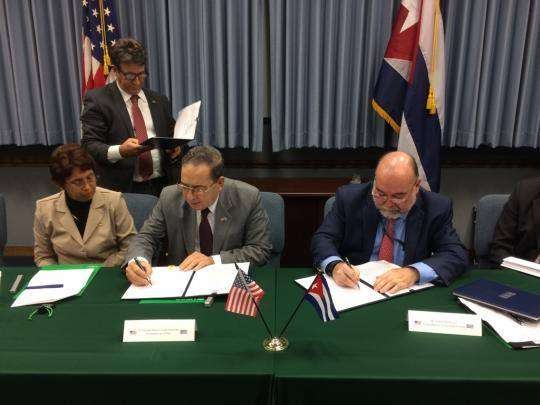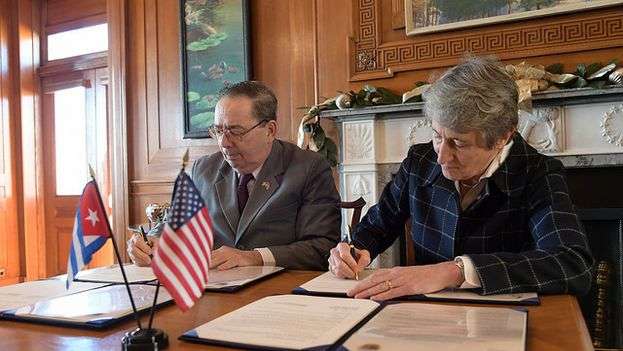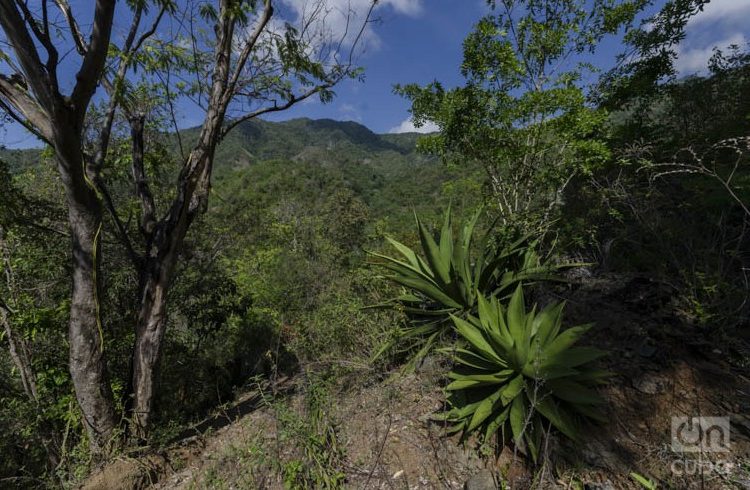In addition to the Memorandum of Understanding signed this Tuesday between Cuban and U.S. authorities on the conservation of wildlife and protected land areas, another was signed this Wednesday on seismology and a third on meteorology and climate.
The three documents were signed as part of a visit to the United States by a delegation from the island’s Ministry of Science, Technology and Environment (CITMA). With these documents, 15 agreements have now been established after the reestablishment of diplomatic relations between both countries.

The memorandum on seismology establishes cooperation in the exchange of information on seismic registers and related geological information, especially in matters related to events of this nature occurring in the Caribbean Sea and the Gulf of Mexico. Its signing reinforces the links between the National Center for Seismological Research (CENAIS) and the U.S. Department of the Interior through the Geological Survey (USGS).
Meanwhile, the instrument on meteorology and climate will cover the forecast areas, the models for atmospheric and climate conditions, the expansion and integration of meteorological observation and vigilance networks, and hurricane analyses and forecasts. Moreover, it will facilitate the joint research on issues related to meteorology, facing climate change, oceanography and atmospheric contamination. Their governing entities are the Institute of Meteorology (INSMET) on the Cuban side, and the National Oceanic and Atmosphere Administration of the U.S. Department of Commerce.
Cuba and the United States signed this Tuesday a Memorandum of Understanding on cooperation and exchange in the area of the conservation of wildlife and protected land areas.
The document was signed in Washington D.C. by U.S. Secretary of the Interior Sally Jewel and the island’s First Deputy Minister of Science, Technology and Environment Fernando González, who headed both delegations just a month before the presidential change in the United States.
According to the spokesperson of the Department of the Interior, the meeting’s aim was to explore potential possibilities for bilateral and regional cooperation on common priorities.
The memorandum recognizes the need for establishing effective relations between both countries in order to carry out joint scientific researches, the shared management of natural resources and cooperation on issues related to environmental education. In addition it sets the bases for cooperation between both countries’ systems of protected areas, taking into account the connection with other ecosystems in the Caribbean region and the Gulf of Mexico.

“We trust that this document will mark the start of a sustained process of exchanges that will allow us to develop scientific researches and share the good practices in the management and conservation in areas identified as of common interest, for a beneficial cooperation between our nations, the region and for the world,” the Cuban deputy minister said.
Meanwhile, Carlos Alberto Díaz Masa, director of the Cuban National Center for Protected Areas, commented that the memorandum will make it possible to work more extensively in the challenges imposed by the protection of natural resources against the impacts of human development and climate change.
The visit to Washington by island’s delegation’s came to an end this Wednesday and during the meetings Deputy Minister González also met with U.S. Geological Survey Director Suzette Kimball.
In November 2015 representatives of both countries signed a Memorandum of Understanding on Cooperation for the Conservation and Management of Protected Marine Areas. This was the first environmental protection instrument between the two nations since the start of the process of the normalization of relations after 17D.
The current meeting between officials from Washington and Havana takes place after the fifth session of the Cuba-U.S. Bilateral Commission, held this December 7. That meeting, in addition to reviewing what has advanced so far, defined the steps to be taken before the arrival to the presidency of Donald Trump, who has threatened to revert the process of rapprochement.










